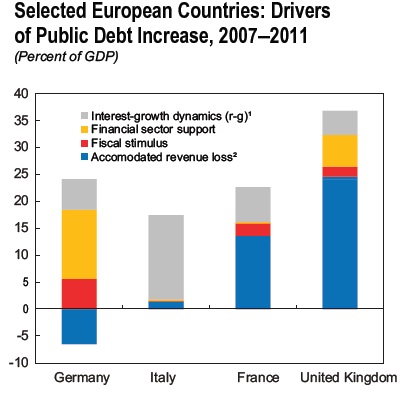Even the arch-technocratic Crooked Timber is a bit distraught at the European Central Bank’s policies:
I’ve spoken to people at the European Central Bank – they are very smart, and very sincerely believe that the best path to long term prosperity is through enforced austerity. They are also – by design – nearly completely insulated from democratic pressure. And despite claiming that they are apolitical, they are in fact playing a profoundly political role, dictating the kinds of domestic institutional reforms that states need to implement if they want to continue getting ECB support.
This means that ECB decision makers are under no very great obligation to think about why they might be wrong, up to the point where complete disaster occurs. And disaster is very likely, if the lessons of the gold standard in pre-World War II Europe tell us anything at all. Enforced austerity does not produce economic growth. What it does produce is political instability.
The people at the ECB may very well be smart — or at least middleclass and polite– but you will never convince them of any facts their paychecks depend on denying. They cannot be reasoned with, they can only be forced to abandon their neoliberal economic orthodoxies and since they cannot be forced through the ballot, it will have to be by the bullet. The radical austerity policies the ECB, IMF, EU and all the other parts of the alphabet soup are enforcing on Europe are pushed through not to benefit the voters, but the banks. Simplistic? Yes, but closer through the truth than what you read in respectable newspapers or hear explained on the news.
Politics and the mainstream media together form a closed system, where only limited deviancy from the orthodoxy is accepted and which has been carefully designed to give the impression of democratic control while making sure to limit any influence ordinary voters might have. Anybody who paid attention could see this in the runup to the War on Iraq: on a single day two million people marched in London alone, millions more across the world but it didn’t stop the war, didn’t even slow it down. It wasn’t an election year and therefore it was easy to ignore the voters: let them march, let them write letter to the editor that won’t be published, let them vent their outrage on Question Time or Any Questions, the smart people know it won’t matter. Give it a month or a year and the smart people can all pretend everybody was in favour of the war; well everybody who counted anyway.
Yeah, sure, Blair had to give up being prime minister a couple of years later, when the smart money was already shifting towards the Tories anyway, but he’s got millions in the banks thanks to cushy jobs given to him by his grateful friends in the private sector and all the respectable newspapers and televion newsshows still take him seriously as peace envoy to the Middle East. Some people might spit on him in the streets, but when was the last time Tony walked anywhere anyway?
Democracy has been made safe for capitalism again; voting won’t change anything important. And if voting doesn’t work, if the ballot is powerless, then the bullet remains…
